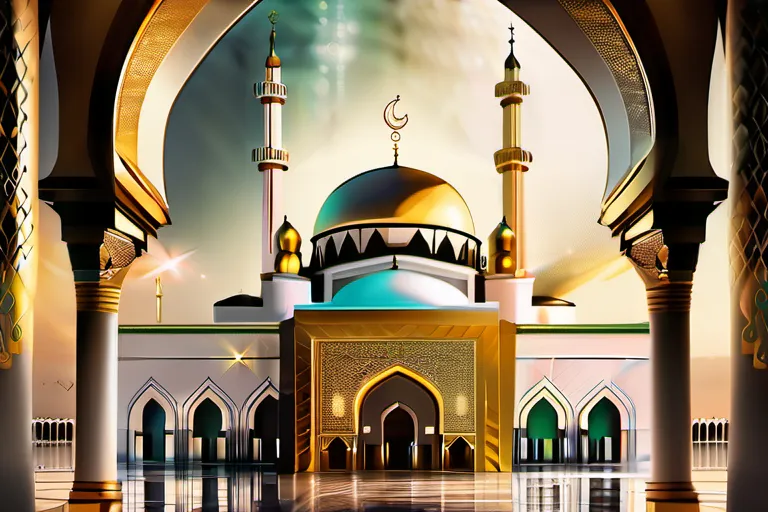Exploring the role, selection, and significance of Imams in Shia Islam
The concept of Imamate is a fundamental pillar of Shia Islam. In this article, we delve into the role, selection, and importance of Imams in the Shia faith.
The Historical Roots of Imamate in Shia Islam
The concept of Imamate in Shia Islam traces its roots back to the formative years of early Islamic history, where it was shaped by profound theological and social challenges. Could we imagine a world without leaders who guide not just through authority but through divinely appointed wisdom? The historical origins of Imamate offer us a glimpse into this intriguing narrative.
Imamate in Shia Islam is rooted in the belief that after the Prophet Muhammad’s passing, his rightful successor should have been Ali, his cousin and son-in-law. Yet, political realities led to the rise of the Umayyad dynasty, which did not recognize Ali’s leadership as divinely appointed. This dispute laid the groundwork for what would later become Shia Islam.
Over time, the idea of Imamate evolved from a mere political disagreement into a complex theological framework. The Imams are seen as living embodiments of divine guidance, guiding their followers through both religious and worldly matters. Could we really think that such an intricate system could have emerged without deep-seated beliefs?
The early Imams, starting with Ali and continuing through twelve successive figures in Twelver Shiism, were believed to possess insight and knowledge that extended beyond mere human understanding. This belief not only shaped the spiritual life of Shias but also influenced their societal structures and practices.
From these historical roots, Imamate in Shia Islam has become a cornerstone of its religious identity, emphasizing the importance of spiritual guidance alongside ritual practices. The evolution of this concept reflects both the challenges faced by early Muslims and the continuous adaptation to changing circumstances over centuries.
The Role of the Imam in Shia Islam
The role of the Imam within the Shia community is akin to that of a guiding light, illuminating the path through life’s labyrinthine complexities. Imagine the Imam as the captain of a ship navigating treacherous waters; in this metaphor, the Imam’s religious leadership serves as the lighthouse, providing direction and guidance for spiritual voyagers. The Imam ensures that followers stay true to the teachings of Islam, much like a compass aligns a ship with its intended destination.
In terms of political leadership, the Imam becomes the voice of the people, advocating for justice and fairness in society. Just as a shepherd oversees the well-being of their flock, the Imam protects the community from external threats and internal divisions. He acts as a mediator between the faithful and the state, ensuring that policies and laws align with Islamic principles. Through his political influence, the Imam seeks to create an environment where every member of society can thrive, mirroring a balanced ecosystem where all elements coexist harmoniously.
The spiritual leadership of the Imam is perhaps the most profound. It involves guiding souls towards divine truths and inner peace. Like a gardener nurturing a garden, the Imam tends to the hearts of his followers, helping them grow in faith and wisdom. His teachings are not just words; they are living examples that inspire acts of kindness and compassion. In moments of doubt or despair, the Imam is a beacon of hope, offering solace and reassurance, much like how a warm fire can dispel the chill of darkness.
The role of the Imam in Shia Islam is multifaceted, encompassing religious, political, and spiritual leadership. Each aspect of his role contributes to the overall well-being of the community, creating a tapestry of guidance and support. The Imam’s influence extends far beyond the confines of a mosque or pulpit; he embodies the essence of leadership, making every individual feel connected to something greater than themselves.
Selection of the Imam in Shia Islam
How does one become an Imam in Shia Islam, you might wonder? The process of selecting an Imam involves a blend of lineage and knowledge, both seen as essential for spiritual guidance within the community. Think of it like passing through a narrow gate; only those who have the right bloodline and wisdom can step through.
Firstly, lineage plays a crucial role in determining an Imam’s suitability. In Shia belief, the Imam is considered the direct descendant of Prophet Muhammad, specifically from his daughter Fatima and her husband Ali. This lineage is not just a matter of family history but is seen as a spiritual link to the divine. It’s like tracing back to a tree’s roots; the closer you are to the source, the purer the water.
However, mere ancestry isn’t enough. The Imam must also possess extensive knowledge. This means not only being well-versed in religious texts but also understanding the complex interplay of faith and everyday life. Imagine an Imam as a guide through a vast, unknown forest; they need both a map (knowledge) and a sense of direction (wisdom).
The process is often seen as a divine appointment rather than a human decision. Scholars and community members look for signs and validate the chosen individual based on their behavior, teachings, and adherence to Sharia law. This validation ensures that the Imam not only has the right background but also the necessary qualifications to lead.
The importance of this selection process cannot be overstated. An Imam is more than just a religious leader; they are the bridge between the community and the divine, guiding believers in times of both prosperity and hardship. Without a clear path for succession, the stability and unity of the Shia community would be jeopardized.
So, when you ask how an Imam is selected, you’re asking about a deeply intertwined process that blends family legacy with personal virtue. It’s a journey that reflects the very essence of Shia belief—a blend of history, faith, and reason.
The Significance of the Twelfth Imam
The belief in the Twelfth Imam, also known as the Mahdi, holds a profound significance in Shia Islam. How can one explain the enduring faith and hope that revolve around this mysterious figure? The Twelfth Imam is a symbol of both guidance and salvation, embodying the promise of justice and peace for humanity.
Imagine the world as a ship battling through tumultuous seas. The Twelfth Imam is like the invisible lighthouse guiding from afar, promising to lead us back to safe harbor. His story begins with his birth in 869 CE, but his life was cut short at just 12 years old when he went into occultation, vanishing from public view without a trace.
His disappearance marks the beginning of a complex period known as Minor Occultation (Ghayba al-Sughra), where he communicated with his followers through deputies. This period lasted until 941 CE and was followed by Major Occultation (Ghayba al-Kubra) that continues to this day, with believers awaiting the Imam’s return as a sign of divine intervention.
The significance of the Twelfth Imam extends beyond historical narrative; it touches on every aspect of Shia life. His existence serves as a constant reminder that even in times of darkness and despair, hope can endure until justice is finally served. The concept of his eventual reappearance, or al-Qiyamah al-Akhirah, becomes the ultimate source of comfort and strength for Shias.
How do we prepare ourselves during this period of anticipation? By seeking knowledge, practicing righteousness, and maintaining faith in the unseen. The belief in the Mahdi’s return is not just a hope but an active call to uphold the values of justice, compassion, and peace as enunciated by the Imams.
The impact of his expected return on Shia Islam cannot be overstated. It shapes their social structure, spiritual practices, and even political aspirations. The concept of Wilayah, or guardianship, which places the Imamate at the heart of Islamic governance, is central to understanding how Shias view leadership and authority.
In essence, the belief in the Twelfth Imam is a living faith that bridges past and future, grounding the community’s present actions within a historical continuity and divine promise. It is this unwavering hope that continues to define and unite Shia Muslims across generations, making the concept of Imamate not just a historical legacy but a dynamic force shaping their lives today.
The Political Structure of Shia Islam under the Imam
Imagine a society where leadership isn’t just about power but about spiritual guidance and ethical governance. In Shia Islam, this concept is embodied through the institution of Imamate. The political structure under the Imam is not just a religious framework; it’s a blueprint for a just and equitable world.
The term Wilayah, which translates to guardianship or leadership, encapsulates the essence of the Imam’s role. It suggests that the Imam acts as a bridge between the divine and the human, ensuring that every aspect of life is aligned with the will of Allah. How can one govern without understanding the true nature of existence? This is where Wilayah steps in, guiding not just individuals but communities.
In Shia theology, the Imamate is a form of divine governance. The Imams are seen as infallible and guided by God’s will, making them the ultimate authority on interpreting religious law (Sharia). This raises an intriguing question: If the Imam acts as both a political leader and a spiritual guide, can we truly separate these roles in practice? Or do they inherently intertwine, like the threads of a woven tapestry?
Consider the implications of this structure. When you have someone who is not only expected to lead with justice but also to interpret divine law, it creates a unique dynamic. It challenges us to think about what kind of leaders we want in our society—those who are guided by their own wisdom alone or those who are seen as being divinely appointed and directed.
The concept of Wilayah is crucial because it defines how power should be used. It’s not about accumulating wealth or dominating others but about serving the community and upholding righteousness. How does this differ from other political structures where leaders might prioritize personal gain over communal well-being? The Imamate underlines a responsibility that transcends temporal gains, aiming for eternal justice.
Reflect on the role of the Imam as both a leader and a guide. Are we ready to embrace such a leadership model in our modern societies, where governance is often marred by corruption and self-interest? The Imamate challenges us to re-evaluate our notions of leadership and what it means to be guided not just by external laws but by an internal moral compass.
The Spiritual Impact of the Imamate on Shia Muslims
The spiritual impact of the Imamate on Shia Muslims is profound and multifaceted, much like the roots of a mighty tree that anchor it firmly into the earth. How can we fully grasp the significance of Imamate for those who follow the path of Shiism? Is it not akin to the constant guidance provided by a lighthouse in turbulent seas, offering hope and direction amidst the chaos?
In Shia Islam, the Imamate is more than just a title; it represents the embodiment of divine guidance. The Imams are seen as the living manifestations of divine wisdom and justice. They are the guardians of truth who continue to provide spiritual direction even after the Prophet’s era has ended. How can one imagine a life without this constant source of light, guiding souls towards the straight path?
The connection between the Imams and their faithful is both profound and intimate. It’s like having a personal mentor who guides you through life’s challenges and provides comfort during times of distress. The Wilayah, or guardianship, of the Imam over the community signifies more than just spiritual leadership; it encompasses a comprehensive role that includes moral guidance and protection against evil.
The Imams are not just figures in history but living entities who continue to influence their followers through their teachings and examples. They act as a bridge between the divine and the human, ensuring that the principles of justice and compassion are upheld even when these values face opposition. How can one underestimate the power of such a connection?
Through the Imamate, Shia Muslims find a sense of security and assurance in knowing they have a leader who always acts in their best interest. It’s like having a parent who always has your back, providing unwavering support and guidance. This spiritual link is what binds the community together, fostering a deep sense of unity and shared purpose.
Conclusion
 By understanding the concept of Imamate, one gains a deeper appreciation for the unique spiritual and political structure of Shia Islam.
By understanding the concept of Imamate, one gains a deeper appreciation for the unique spiritual and political structure of Shia Islam.











